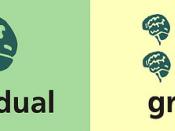More and more, Americans seem to be getting false conceptions about peace. They seem to think that, when another nation is disturbing the peace of our nation, that the only way to solve this problem is through violent means, most notably war. This could not be further from the truth. Because I believe that war is not the best way to solve for conflicts, I must affirm today's resolution: When called upon by one's government, individuals are morally obligated to risk their lives for their country.
Before I go on, I will define key terms in the resolution. Government is defined by the Oxford English Dictionary as "the system by which a state or community is governed". Moral is defined by the Oxford English Dictionary as "standards of behaviour, or principles of right and wrong." Obligation is defined by the Catholic Encyclopedia as "bond which by a legal necessity binds us to do something according to the laws of our State."
From these definitions, we can draw the conclusion that in order for someone to have moral obligation, he or she must have made a conscious decision as to whether or not the act they plan on doing is right. If something is not considered morally right, there can be no moral obligation.
The value I chose to uphold is individuality. Individuality must be upheld on today's round because it is the basis for diversity in any nation, and, along with diversity, comes a nation that functions as a community. In diverse countries, there can be either a good sense of diversity with a good sense of individuality, or there can be diversity with no individuality. When individuality is a nation's top priority, they get a strong feeling of patriotism from the people.
The criterion I'm using in today's round...


